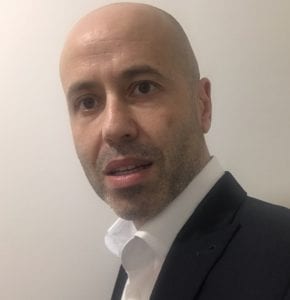Moving climate change up the agenda

The ICE365 and DigitalRG.com Materiality Matrix will be the first project to plot the gaming sector’s ESG priorities in the coming year. Click here to take part.
It would be difficult to find a sizeable business publication or analyst report doing the rounds these days that didn’t contain at least a mention of the term ESG. Though environmental, social and governance issues had already been rising in prominence in recent years, the pandemic brought about a renewed focus on the first two aspects in particular.
Indeed, earlier this year Blackrock chief executive Larry Fink used his influential annual letter to CEOs to implore business leaders to put their sustainability credentials at the top of their agendas.
He was particularly forceful on the environment. “I believe that the pandemic has presented such an existential crisis – such a stark reminder of our fragility – that it has driven us to confront the global threat of climate change more forcefully and to consider how, like the pandemic, it will alter our lives,” he said.
He added: “No issue ranks higher than climate change on our clients’ lists of priorities. They ask us about it nearly every day.”
When such a statement comes from the head of the world’s biggest asset manager, it’s difficult for any business to ignore.
Pressing issue or distraction?
But given the gaming industry is not typically associated with environmental concerns, is it really important for gaming companies to make improving their environmental credentials a strategic priority?
Increasingly, in an industry rife with M&A activity and private equity investment, the answer is likely to be yes. “Investors and rating agencies are really pushing environment and social governance questions to us,” says Philipp Gaggl, group head of ESG and corporate responsibility (CR) management at Novomatic.
Like many other industries, Gaggl says gambling was somewhat late to the party in this area, though an EU directive requiring large companies to report on their sustainability with annual non-financial reporting forced it into action. Coming into force in 2018, the directive provided the impetus for firms across many industries to take ESG more seriously.

Since then, the importance of sustainability index and benchmarking tools has grown and their coverage widened, such that gambling firms are increasingly being compared with firms from other sectors on ESG metrics.
For its part, Novomatic has invested heavily in improving its ESG standing and was last year ranked third among the 80 international gaming companies rated by Sustainalytics. The ESG and corporate governance research, ratings and analytics firm assessed it to be at, “low risk of material financial impacts driven by ESG factors”.
“With Sustainalytics we are one of the top three of 80 companies they are assessing – we started three years ago at mid tier. If you have a good ESG rating compared to your peer group it is really something that can help attract more investors. Also, in the future credit conditions for lending money may be impacted by how good your ESG rating is and so it becomes a financial issue as well,” says Gaggl.
At Entain, which was included in the 2020 edition of the Dow Jones Sustainability Index and the S&P Sustainability Yearbook 2021, and is also listed on the FTSE4Good, head of ESG Jay Dossetter says ratings help companies demonstrate their sustainability efforts are more than just a tick box exercise.
“Everyone can see that ESG is becoming a very big factor for investors, so there will always be a tendency to put your best foot forward and it can become a bit of a PR exercise. What these ratings agencies help you do is actually gain a rigorous assessment. It is not just about your press releases – they look under the bonnet of the business and can actually see if this business is really committed, if is really carries on throughout its operations doing what it says it does. That is why those three ratings agencies are an important marker.”
This is a key point – while gaming firms do periodically announce environmental initiatives, such initiatives need to be embedded in a company’s core purpose to make a difference. It’s not enough for a firm to announce that spurred on by Covid it has decided to cut business travel in future, it has to demonstrate how this feeds into an overarching strategy that benefits the environment in a significant way.
“The industry needs to move away from input discussions – like how many activities do we have, and how many projects do we have – towards the impact discussion: what do we really change in how we do business?” says Gaggl.
Competing priorities
One issue is that even for those companies actively working on improving their ESG credentials, the E part of the equation appears to get relatively less attention in company ESG and CSR reports. Given the huge amount of pressure on the industry on the social front, this is perhaps understandable.
After all, an oil firm or renewable energy provider probably places far more emphasis on the environmental aspect than it does on social concerns.
“It is not a secret we don’t have full points in the environment space because it is not something as an industry we were used to talking about and we didn’t really consider it as business critical,” says Gaggl.
Another factor behind the industry’s focus being elsewhere has also been its customers, he adds. “The customer unfortunately is not yet asking these questions and that is why there was very late this drive to think about it in a strategic manner. With the food industry, for example, there were a lot of customers who would say, ‘I want organic’ or ‘I want regional’.”
However, if customers haven’t yet been too demanding on the environmental front, the same cannot be said for employees, says Steve Howells, Entain’s group health and safety, security and environment director. “We definitely want to recruit and retain the best people and we want to be the best business for them to work in.
“[Compensation and benefits] are really important to people – I think they always will be – but certainly the new generation, they want to work for organisations that have got a clear ESG agenda, whether that be gender diversity, diversity and inclusion, equal opportunity or the climate change agenda.”
William Hill’s David Medori, chief procurement officer and the company’s lead on the environment, agrees. “The younger generation, the Millennials, the Gen Zs, they really want to know what you’re doing on this, so if we’re not doing something and can’t shout about it, that is going to hurt our recruitment and retention.”
Medori has set tough targets for the company to meet on the environmental front, including a 30% reduction in waste going into landfill, a 50% reduction in water use and for 30% of its vehicle fleet to be electric by 2024.

It also aims to become carbon neutral, though there is not yet an official time frame in terms of the goal for achieving this. Last year’s move to use only renewable green energy in the UK was an important step, but Medori says the company wants to go much further before trying to balance the books.
“A lot of businesses out there, including William Hill, could be carbon neutral if we did an offsetting piece, but that is not what we want to do. We want to do our bit in really driving down our consumption first and foremost so we are at the minimum. We are really doing that. Once we’ve got our consumption down the only thing left then is some minimal offsetting activity to get us to the carbon neutral position.
“I would love to shout that we are one of the first businesses to achieve that goal and I think we could certainly do that. It makes a great case – if a gambling company can do it then surely there is nothing stopping other businesses doing it because clearly that is not our bread and butter, that is not what we do as a business.”
Entain has committed to becoming net zero by 2035, but similarly, Howells says, “we are not going to buy our way out of net zero”.
Buy in at all levels
Instead, the company has embarked on an education campaign to embed environmental awareness throughout its operations.
“Whilst as a company we can spend lots of money on lots of infrastructure projects, 24,000-plus colleagues doing the little things really often and making them habitual will have the biggest impact. Things like switch off and save, only use what you need in terms of electricity and water,” explains Howells.
He says this also extends to customers. “There is lots of paper in shops and we are going away from that with our digitalisation programme, certainly in our retail shops, and customers need to be at the forefront of that,” he says. “We need to influence them in their behaviours and that is a big step change, particularly for our customer demographic, which is typically blokes of a certain age.
“The first part of that is education because we need to tell them we are on this journey and we want them to come along with us.”
For Novomatic, one of the key priorities is measuring and providing feedback to its many subsidiary companies to make sure the group’s strategic pillar of Going Green trickles down.
“We give them a checklist on the environment side with 15 different topics. We show them in the past three years you have reported to us that out of the 15 environment activities you have only done five, so think about the other 10,” explains Gaggl.
“We are basically showing them what our activities are across the group, so installing solar activity, switching to green electricity, changing the light bulbs to LED, increasing emobility, etc, and then we basically give the feedback to them that in the last three years we haven’t heard from them on certain things so maybe these are something they can consider.”
Of course, some of these type of changes require investment and Medori says this can be an issue. “The biggest challenge that we have is when things cost money and we need to take investment out of the business when it could be going into gaming and sportsbook – new gaming products, tech platforms, improving our shop experience. However, this is where I have got to put forward a compelling business case to make sure I get some investment allocated and make sure whatever I put down is going to be the right level for the return.”
This is where external recognition such as ratings can help, says Gaggl, particularly at the highest level of a company. “Last year we achieved really good ratings and had improved across all of them. This became a visible success, which created more awareness among the board, the supervisory board and other management that this is not just a tick box exercise where you can only lose time or resources and there is nothing to win. It is also something where you can gain attractiveness with investors.”
On this last point, he says the industry could be missing a trick. “Although we face a lot of bias as an industry, interestingly we hear as an example from banks that they say, ‘at least we can invest in you with good conscience if you show us you are doing responsible gaming in the best possible way as we have less issue investing in your shares than, for example, oil and gas companies or air travel companies, etc, because they have a huge issue on the climate and environment side, which the gaming industry doesn’t have to that extent’. So it is actually an advantage, which I think is really interesting and which I think a lot of people don’t see.”
Environmental measures could even provide a chance for the industry to improve its perception among some quarters, says Dossetter. “It is fair to say the gambling industry gets criticised on a lot of fronts and probably the environment is one area we don’t get criticised for as a rule and so there is an opportunity there.
“We invite the whole industry to come on side with us and it would be great if the whole of the gaming industry made a similar pledge to us and made that commitment to go net zero because that would actually be a really positive thing for the industry.”
